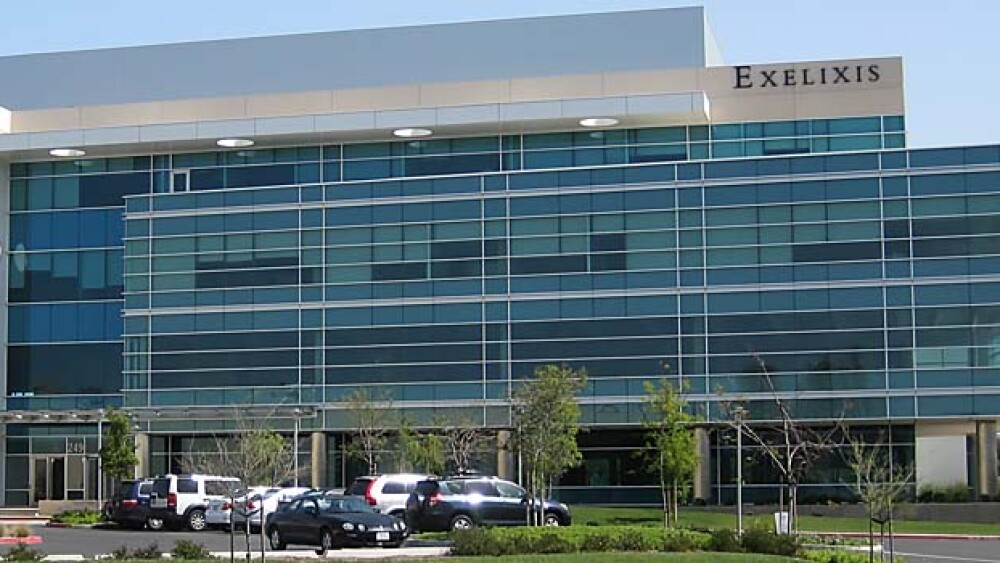In the CONTACT-02 pivotal trial, the combination of Exelixis’ Cabometyx and Roche’s Tecentriq reduced the risk of disease progression or death by 35% in patients with metastatic castration-resistant prostate cancer.
Pictured: Exelixis headquarters/Company courtesy
Exelixis announced Thursday detailed results from its Phase III Contact-02 trial evaluating Cabometyx (cabozantinib) in combination with Roche’s Tecentriq (atezolizumab) in patients with metastatic castration-resistance prostate cancer.
In the late-stage pivotal study, the Cabometyx-Tecentriq combo reduced the risk of disease progression or death by 35% compared with a second novel hormonal therapy (NHT) in patients with metastatic castration-resistant prostate cancer (mCRPC) and measurable extra-pelvic soft tissue disease who have progressed on one prior NHT.
The positive results were initially reported in August 2023 with the Phase III study reaching one of its primary endpoints of progression-free survival (PFS) in an analysis conducted in the first 400 randomized patients in the intent-to-treat (ITT) cohort.
The complex data from the trial showed that the PFS ITT population’s median follow-up of 14.3 months had a hazard ratio of 0.65 and a p-value of p=0.0007. The median PFS for the combination was 6.3 months versus 4.2 months for those only taking hormone therapy, earning the combination a p-value of p=0.0002.
After a follow-up of 12 months, the ITT population had a median overall survival of 16.7 months compared to 14.6 months in the hormone population, getting the combo a p-value of p=0.13 and not meeting the requirements for statistical significance.
The findings are being presented Thursday at the American Society of Clinical Oncology 2024 Genitourinary Cancers Symposium.
Exelixis said that the study will continue to the subsequent analysis of overall survival, which will be released sometime this year.
In terms of safety, the company reported that treatment-emergent adverse events occurred in 97% of patients treated with the combo, with grade 5 events happening in 8%. By comparison, treatment-related events caused 13% of patients treated with the combo to halt the trial.
“Given there are limited options after progression on novel hormonal therapy, we recognize the need for a regimen that can delay disease progression, that has an acceptable tolerability profile, and that is widely available to patients who may not have the means or desire to travel to specialized centers for other therapies,” Exelixis CMO Amy Peterson said in a statement. “Our decision to conduct Contact-02, based upon a signal we observed in Comet-01, underscores our commitment to patients with advanced prostate cancer and to improving their standard of care.”
Peterson said the company plans to discuss these results with the FDA but did not indicate how the combinations’ timeline will progress.
“Contact-02 is the only Phase III study evaluating a tyrosine kinase inhibitor and an immune checkpoint inhibitor to show a statistically significant improvement in progression-free survival and a trend for overall survival in these patients. I am encouraged by these results and the potential for cabozantinib plus atezolizumab to be a widely available treatment option for our patients,” Neeraj Agarwal, the senior director for Clinical Research at the Huntsman Cancer Institute at the University of Utah and the global lead investigator of the trial, said in a statement.
In August 2023, the company stopped its Phase III Cabinet trial for Cabometyx ahead of schedule after an independent board found that treatment with the drug led to a significantly longer time without disease progression or death for pancreatic cancer patients.
Tyler Patchen is a staff writer at BioSpace. You can reach him at tyler.patchen@biospace.com. Follow him on LinkedIn.






